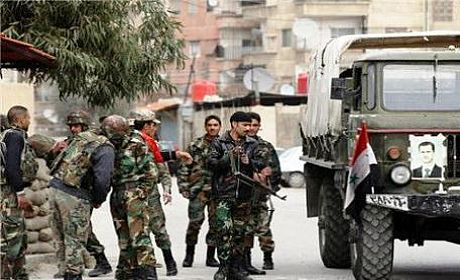West’s New Tactic: Maintaining Military Balance

The radical armed opposition close to the al-Qaeda movement has long made trouble for the western front in Syria. The conundrum which has been created with the support of Qatar and Saudi Arabia and with the help of Turkey and the western countries to train, arm and enter these groups into Syria is gradually creating problems for their strategy in Syria and its future. What tactic have they chosen in order to confront this conundrum facing the US and the European Union?
It must be stated that all of the influential players in the Syrian crisis do not necessarily pursue similar long-term objectives. Of course, the temporary demands of the opposing governments from the opposition coalition do somehow converge: they all want to move past this critical stage and this complicated deadlock; all of them are concerned about the lack of solidarity among the opposition, even within the national coalition; a major part of the main players in both the fronts supporting and opposing the present government are seriously concerned about the growing power of the foreign radical armed Salafi movement close to al-Qaeda. But this does not mean that they have common views about the future of Syria. Each party follows its own goals and strategies. These days, there is talk that the US priority has moved from the Middle East to the Far East or southeast Asia. But even if, based on numerous analyses, such a claim is correct, it would be gradual and would not mean that they would leave their hostilities and ignore their traditional goals and not be concerned about the demands of their allies in the Middle East.
A look at Obama’s visit to Tel Aviv on March 20th to the 22nd indicates the growing pressure exerted by the western front against the ruling government in Syria. The developments of recent days in the region show the direct and indirect consequences of this visit in increasing pressure on Damascus, in both political and military dimensions.
1. Netanyahu’s telephone apology to Erdogan with Obama’s mediation, two years after the Zionists’ military attack on Turkey’s Marmara ship in Gaza waters, is evaluated as a political step by the western countries to bring their allies together in one front against one single target.
2. At the same time, Ocalan’s invitation of PKK forces to retreat and halt fighting against the Turkish military in two separate statements, upon which Turkish officials maneuvered enormously, has been very significant. The Kurdish Democratic Union Party of the Syrian Kurds (the Syrian branch of the PKK), which, through a pact with the government forces of Bashar Assad, has for a long time had control of the north-eastern Kurdish regions of Syria and which fights against Syrian opposition groups, might change its path towards neutrality or even fighting against the Bashar Assad government if the situation in Turkish Kurdistan turns in favor of Ankara.
3. Giving Syria’s seat in the Arab League to the National Opposition Coalition, in the first meeting of Arab foreign ministers in Doha, Qatar, after the rotating presidency of the Arab League was transferred from Baghdad to Doha.
4. The resignation of Najib Mikati, the Lebanese Prime Minister, and the introduction of Tamam Salam, the candidate of the March 14 alliance, after a visit to Riyadh and the agreement of Saudi Arabia, which will increase the pressure of Syria’s opponents in Lebanon on the ruling regime in Damascus.
5. The attack of Israeli Air Force jets on Syrian army positions in Tel Fares in the Golan Heights was an unprecedented measure following the 1973 war and is considered as breaking the cease-fire between the two parties and changing military equations in order to exert more pressure on Damascus.
6.The explicit positions taken by the US and some European governments based on giving military assistance to the opposition of the Syrian government, including the French Foreign Ministry which officially declared its support for the Syrian opposition in order to create balance between the conflicting groups and prevent the domination of the radical Salafi groups over the Free Syrian Army, along with the training of thousands of Syrian opposition forces in Jordan, are all signs of more pressure being exerted in order to remove the deadlock. It should be mentioned that until recently the US and Europe rejected any military assistance to the Syrian opposition.
Considering the new circumstances, prediction of the situation on the ground is not easy. Other than being a serious threat to the Assad regime, the presence of the radical armed groups is more importantly an international concern for the future of Syria and the region. In such a complicated and non-transparent situation, the growing number of people being killed and the gradual destruction of the major infrastructures of the country are the only consequences of the continuation of the present situation and the war. It seems that the western front does not oppose using such tactics in order to maintain the military balance.

